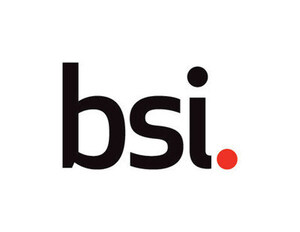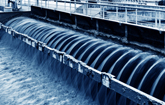BSI/Waterwise insight highlights tackling water scarcity to be as much a priority as climate change
HERNDON, Va., Aug. 23, 2023 /PRNewswire/ -- Levels of water scarcity are soaring in major economies including the US, as annual water use has risen by around 3,500 billion m3 globally over the last century. Action to increase water circularity through global collaboration and innovation could help tackle this. Doing so will bring wider benefits - including reducing drought risk, supporting climate goals and advancing social development to meet the UN Sustainable Development Goals - according to new research by BSI and Waterwise.
Thirst for change: securing a water positive future notes that water provision and use contribute around 10% of global carbon emissions, while drought could affect as many as 75% of the world's population by 2050, meaning inaction now could be as detrimental to the planet as not tackling the climate crisis.
The report sets out the key steps that could have a positive impact, including recognizing that tackling water scarcity could be a sustainability opportunity as large as reducing climate change, making it easier for consumers to choose water-saving products and embedding a circular economy mindset.
The study by BSI, the business improvement and standards company, in partnership with Waterwise, includes an Indicator evaluating water scarcity in 40 locations, with the US receiving the highest possible rating for water scarcity. In the US only 28% of freshwater is available to be used as a resource, and the country has high levels of personal consumption and leakage per capita, with municipal water also being very cheap relative to GDP. States such as Arizona, California and New Mexico are in very challenging positions.
Just 0.5% of the water on earth is fresh water1 and a combination of population growth, climate change and economic development is driving demand and putting growing, unsustainable pressure on this supply. Yet, the findings come with recognition of the importance of water management. According to polling commissioned by BSI, nearly 67% of consumers and 80% of small business leaders identified clean water and sanitation as 'part of sustainability,'2 while half of the former and 44% of the latter placed it in the top five issues to focus global resource and effort on.
Jonathan Chocqueel-Mangan, Chief Strategy & Transformation Officer, BSI, said: "Water is one of the earth's most fundamental and precious resources. We have launched this partnership to understand more about how we can collaborate to uncover opportunities to improve water availability by providing solutions that will benefit people and planet.
"Ensuring a water-secure future could be as big an opportunity as reducing carbon emissions. As an organization focused on driving business improvement, we hope we can have a significant positive impact on society and organizations alike by advancing this debate."
Using water wisely can bring important benefits, including enabling equitable global access, protecting precious habitats and making the global community more resilient to climate change and drought. It makes a series of recommendations, including:
- Recognize water wastage as a serious challenge - acknowledge the issue and act, with utility companies leading the way to reduce network leakage
- Ensure it is easy to choose water-saving products and make sustainable choices – for example learning from countries including Australia, which apply mandatory product water efficiency labeling systems aligned with the relevant standard
- Embrace innovation and make better use of data - smart meters have the potential to be a game changer
- Encourage a water-saving culture - whether that is at home or in the workplace, and across different sectors
- Close the loop - make water recycling and reuse the norm where possible, using techniques such as rainwater harvesting
- Partner for impact - ultimately, all of us as water users can help address the growing challenges around water availability.
Collaboration and a move towards a water-saving culture can accelerate progress. The report sets out affordable and accessible actions to address water scarcity, including the increased use of smart meters and installing alternative water supply systems into new buildings.
Martin Townsend, Director for BSI Centre of Excellence for Sustainability, said: "Water is one of our most fundamental and undervalued resources - it is the blue thread that connects our world – and using it wisely can bring important benefits, helping us to maintain good health and a biodiverse natural environment, ensure we have sufficient food supplies and contributing to economic growth. But it is becoming increasingly clear that it is not sustainable for demand for water to continue to rise without action to ensure we are using it wisely and managing it efficiently."
Notes to Editors
Country Specific Data
- A key area of water use in the home is showering – a large use of water in US homes at 20% of total use.
- In the US, water used in hospitals and other healthcare facilities comprises 7% of the total water use in commercial and institutional facilities.
- A number of organizations have made recent water neutrality or water positive commitments as they recognize the impacts and dependency of their operations and supply chain on water availability, including Facebook, Microsoft and PepsiCo.
A Love Affair: Smart Meters
- North America, followed by China, currently occupies the largest smart water meter market share, with the former taking up 44% of the market.
- 50 million smart meters are forecasted to be shipped globally in 2023, around four times higher than in 2017, and the global market is expected to double by 2027. A recent report predicts that by 2030, there will be 700 million smart water meters installed to help tackle the challenge of conserving water and reducing with significant increases in Europe, China, Japan and North America
- In the US, under Department of Energy guidance, all federal buildings are required to be metered for water, and where possible, for these to be smart meters.
About the research
BSI commissioned Waterwise to collate credible, referenced and traceable data related to water availability, water use and water efficiency/wastage data from a number of target countries. The report covers the UK, USA, Japan, China, Australia, France and Germany, noting that these are net water consumer countries while also looking at the role of specific sectors, including retail, health sectors and the built sectors. Where possible the information gathered is comparable between countries.
The research was developed by Waterwise's expert team and involved consultation with the NGO's international partner networks, including the American Water Association, the International Water Association and The Water Conservancy in Australia.
The BSI Water Security Indicator, a tool created in partnership with Waterwise, which sits within the report, assesses 40 countries on seven markers. It rates seven countries to be facing the highest possible risk, and even countries like France, Germany, the UK and Australia to be facing medium risk. With the urban population expected to increase to 6.7 billion by 2050, the report highlights that using water wisely is critical to support economic development and social needs and meet the UN Sustainable Development Goals.
About BSI
BSI is the business improvement and standards company that enables organizations to turn standards of best practice into habits of excellence, 'inspiring trust for a more resilient world.' For over a century, BSI has driven best practice in organizations around the world. Working with over 77,500 clients across 195 countries, it is a truly global business with skills and experience across all sectors, including automotive, aerospace, built environment, food and retail and healthcare. Through its expertise in Standards and Knowledge, Assurance Services, Regulatory Services and Consulting Services, BSI helps clients to improve their performance, grow sustainably, manage risk, and ultimately become more resilient.
The partnership with Waterwise sits alongside work underway internally at BSI to gather information about the organization's water impact in terms of consumption and ownership and to identify what is currently done to preserve water. These data will then be used to set a company-wide strategy for water preservation at BSI.
About Waterwise
Waterwise is the leading independent voice in the UK for using water wisely, for the benefit of people and the planet. Our vision is that water is used wisely every day, everywhere, by everyone. We are the UK's conscience on water efficiency, on behalf of people and the planet, and are experts in water efficiency policy, regulation, research, behavior and campaigns. Waterwise is a people-led organization which prioritizes the wellbeing of its staff.
1 Whilst water is abundant on Earth, only between 1-3% is freshwater, of which approximately 0.5% is considered accessible (Water security is a national security issue: What's needed now, World Economic Forum, February 2023)
2 Research conducted for BSI in 2023 by Malvern Insight & Yonder in May 2023. Consumers: Data based on 1,020 interviews (514 UK, 506 USA) with nationally representative sample. SMEs: Data based on 223 interviews (120 UK, 103 USA) with decision-makers within SMEs (up to249 employees).
Jennifer Lipman, [email protected], 07833 437 627
SOURCE BSI

WANT YOUR COMPANY'S NEWS FEATURED ON PRNEWSWIRE.COM?
Newsrooms &
Influencers
Digital Media
Outlets
Journalists
Opted In





Share this article